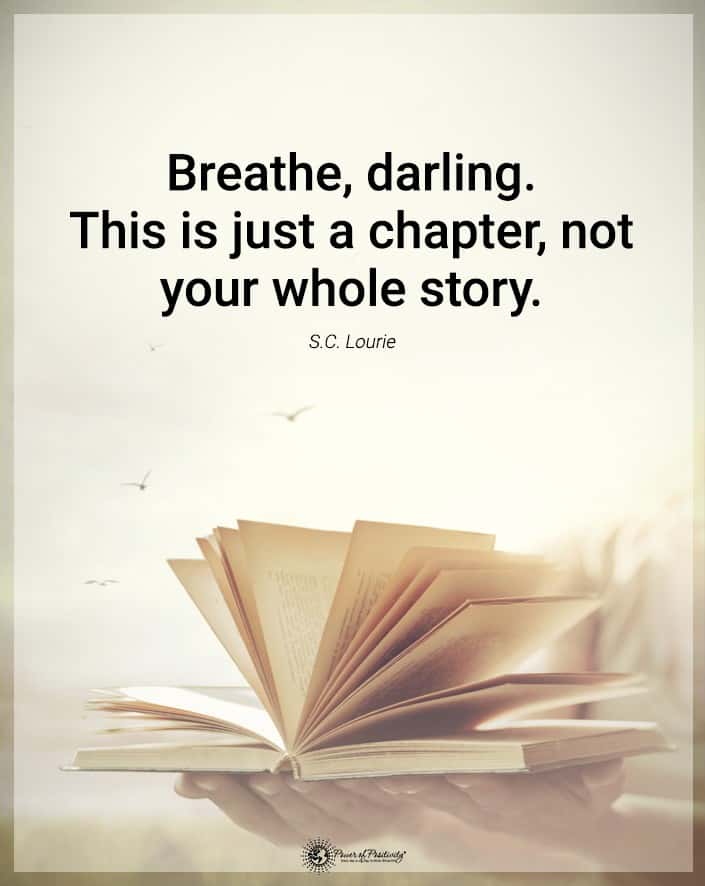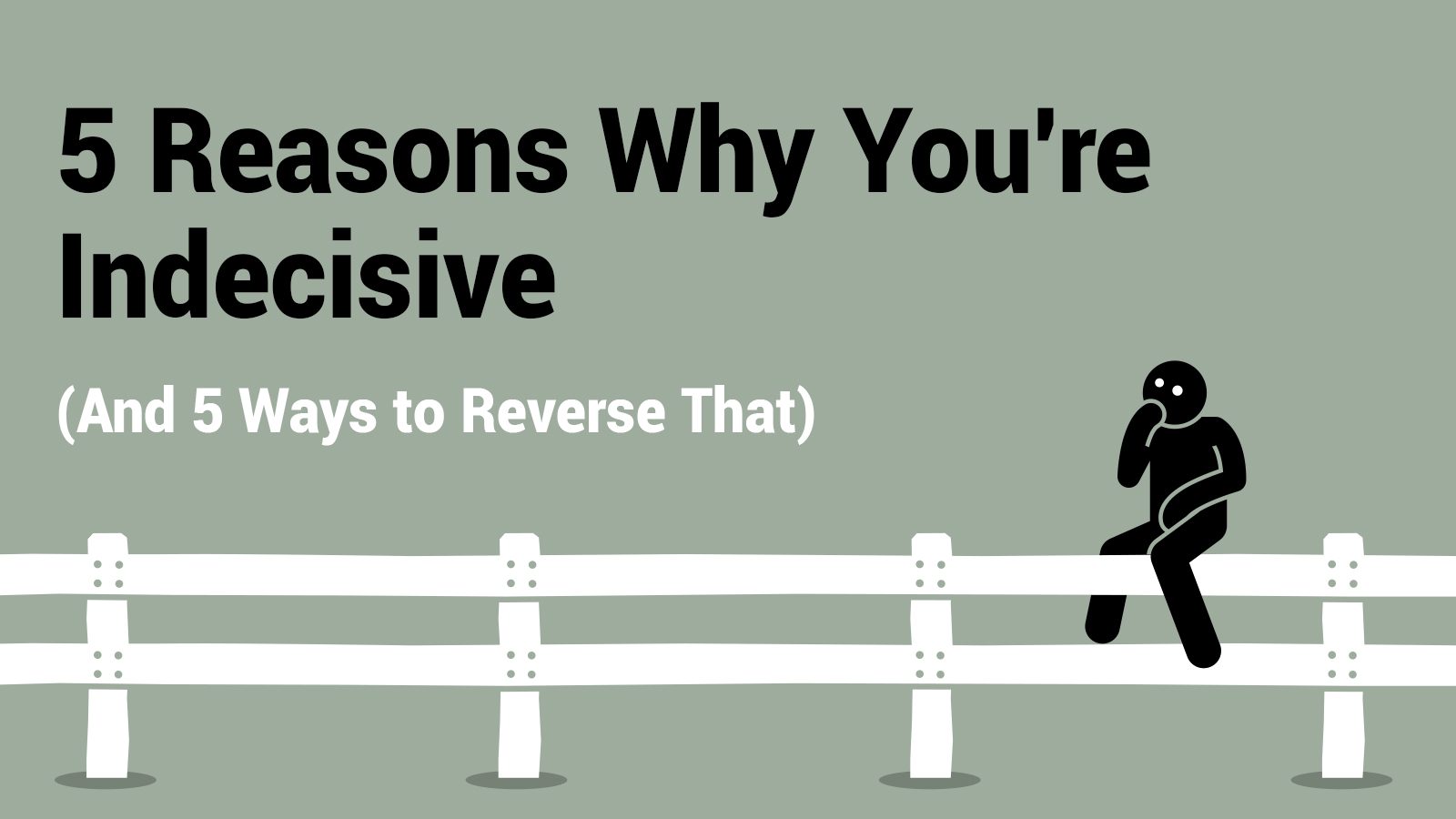Life is all about making decisions. From choosing what to eat to deciding on life-changing opportunities, each day is filled with options that you must pick between. If you have trouble with being indecisive, it can clog your life with unnecessarily wasted time.
Indecision is a common problem that many face, and it’s a complex topic with many potential causes and solutions. Here are five reasons why you’re indecisive and ways to reverse that in 5 methods.
5 Reasons Why You’re Indecisive
Do any of these traits sound like you?
1. You’re A Perfectionist
 People may tout perfectionism as a positive thing, but its drawbacks can be easily seen within the term itself. Indeed, it’s the act of seeking perfection, something that is inherently impossible. There’s no way to make everything perfect all the time because nothing is perfect, and that’s part of what makes life interesting.
People may tout perfectionism as a positive thing, but its drawbacks can be easily seen within the term itself. Indeed, it’s the act of seeking perfection, something that is inherently impossible. There’s no way to make everything perfect all the time because nothing is perfect, and that’s part of what makes life interesting.
Studies have found that perfectionism is linked to indecisiveness. This is because:
- Perfectionism can often mean fear of not getting the best outcome, making it hard to make decisions when even a slightly less favorable result would be condemned as imperfect.
- Perfectionism can stem from childhood upbringing; if you were in an environment where being right was more important than learning and growing, your desire to be right can muddle decision-making with an obsession with getting it right.
- Many decisions involve unknown elements, and perfectionists like to analyze every bit of knowledge to make the best decision, even when that knowledge isn’t available.
2. You Are Afraid
Fear is a powerful motivator. Being afraid can make someone act out of character, show their true colors after years of hiding, or trap someone in a stagnant, frozen state – that’s how powerful it can be. And being frozen in fear is a quick way to become too frightened to decide anything. You might be afraid that:
- You’ll make the wrong decision
- You will lose valuable safety nets
- You’ll have to deal with change and adjustments
- You won’t be able to know what’s coming next
- You’ll suffer as a result of your choices
- You’re not good enough for your decisions
These kinds of fears quickly prevent you from solidifying a choice. The consequences for that choice are ones you may not ever want to face. Worse still, this can result in you making no decisions at all and winding up in an even worse situation than if you’d just picked anything at all.
3. You’ve Lost Sight Of Your Goals
Big decisions are all about choosing which ones best align with your personal goals. When you’ve lost sight of where you’re heading in life, it’s easy for choices to become harder to make. You don’t feel the pull of your passions and drive as strongly, so you’re crippled as to what would best help you.
On top of that, the act of overthinking and anxiety can drive you even further away from properly keeping your goals in mind. You don’t know what you want any more, and you slip into uncertainty as the things you’re aiming for don’t make sense to you at the time. Without a clear guiding light, you don’t know where your desires to point, which can contribute to decision-making difficulty.
4. You Have A Scarcity Mentality
A scarcity mentality refers to the concept of believing that there is a limited, or scarce, amount of resources in the world. This thinking doesn’t refer to more significant big-picture crises where resources are limited. However – it relates to the idea that there is only a certain amount of success that can happen to humanity, and if you miss out, other people will claim those remaining spaces.
The concept exists in many forms, but the ways it may be affecting your decision making include:
- Causing a belief that every decision must involve a close look at every minute detail necessitates full evaluation to a microscopic level of every aspect of these decisions.
- Altering psychological, neural processing at a subconscious level, leading you to make decisions based on the fear of losing out (according to research).
- Freezing you amid complex calculations into the future, involving outcomes you cannot possibly accurately guess or know.
- Believing that others are your competition, causing you to factor their thoughts and personal path into your decision-making.
5. You Want To Please Everyone
It’s okay to enjoy making others happy. But at the end of the day, you can’t be responsible for others, nor can you successfully please everyone in your life. Some of the decisions you make will face disagreement and discord, and you’ll have to make choices against the wishes of the people around you.
If you’re trying to please everyone and gain everyone’s validation and approval, it’s pretty apparent that indecision will follow. You emphasize the desires of others instead of your own. While it’s good to listen to other perspectives and accommodate some people in certain circumstances, decisions regarding your life have to be influenced primarily by you.
 5 Ways To Reverse Being Indecisive
5 Ways To Reverse Being Indecisive
Are you ready to become more firm in your decisions? Take a look at this advice.
1. Ask Who You’re Aiming To Please
It’s true that sometimes, you have to make decisions while taking into account certain other people. That can make choices more difficult, especially if it’s reasonable to include them. But if you’re indecisive by nature, the chances are that you tend to try to please too many people at once.
So ask yourself: who are you trying to please with your decisions? And should you care about their thoughts on your choices? For example, are you:
- Trying to prove yourself to someone who isn’t worth the effort or the wasted decision?
- Aiming to please everyone around you, including people with opposite opinions on the matter?
- One of the people you include in your considerations people whose opinions shouldn’t have a say in your choices?
- Someone who you’re trying to please known for being a perfectionist or demanding the impossible?
Consider if you’re allowing yourself to try and please too many people. It might be time to let some of them down gently. Remember, when you’re making decisions about your personal life, only your say matters in the end. It’s your responsibility to make choices and deal with the consequences, so why should anyone else get a say?
2. Think Well Of Yourself
Many indecisive people are also insecure or have low self-esteem, which leads to:
- Fear of being unable to make the right decision or a lack of trust in their capabilities to handle any possible consequences.
- Thinking you’re not worthy enough for certain decisions and outcomes that could otherwise positively affect your life.
- Acts of seeking validation from others by making decisions that will please, accommodate, impress, or receive attention or praise.
This is why positive thinking when you consider yourself is so important. Being aware of your strengths allows you to feel more confident in making decisions, as you know what you’re capable of and are more assured in your thought processes. Cultivate healthy self-esteem by listing and appreciating your strengths and feeling validated intrinsically.
3. Understand The Broadness Of The Decision
There’s a broad spectrum of different choices, with varying severities, degrees of urgency, and degrees of importance. Fully comprehending where a decision lies on that spectrum will allow you to respond appropriately instead of rushing an extensive choice or overthinking a small matter. Here are some questions to consider:
· What Matters Most In This Choice’s Outcome?
What do you want to come out of the choice that you’re making? Do you want personal happiness? Do you want to keep the peace? Are you looking for practical answers that may not be the most interesting but are essential for more profound reasons? Focusing on what is essential can allow you to hone in on the exact details required to make your decision.
· How Far-Reaching Is The Choice?
How will this decision affect you in the future? And how will it affect you in ten days? How about in ten months? How about in ten years? Something that will have semi-permanent effects on you is likely to be worthy of more consideration than something that won’t matter anymore in a week. You will feel less indecisive once you put this into perspective.
· Can The Choice Be Reversed?
Once you make this decision, can you go back on it? Will you be able to wing it if you see that things aren’t going to plan? If it is changeable, what will the effects of change be? A decision with long-term, unchangeable results requires more careful thought than something you can go back on.
4. Visualize The Outcomes
If you’re having trouble deciding what to do, it can be helpful to try imagining the possible outcomes. Consider trying these actions why you feel indecisive:
- What is the best-case scenario for each choice? Imagine them.
- What’s the worst-case scenario for each choice? How will you handle those scenarios? Imagine yourself handling them.
- What is your goal outcome? Imagine it. Which of the envisioned scenarios fits best, and which one are you more ready to handle adverse effects of?
Creative visualization can help you to make decisions by giving you a projection of yourself at your best. The goal is to visualize a good outcome with positive thinking or imagine yourself capably handling negative ones. You’ll feel more confident in your choices after this, and the visualization may help you realize what’s important.
5. Forgive Past Bad Decisions
Holding onto past bad decisions can cripple you when you need to make new ones. The mistakes of your past may haunt you and cause you to second-guess regularly, which ironically may lead to more flawed decisions that generate more failure.
Forgive yourself for the bad decisions you’ve made, and then practice validating your new choices. Remember the times that you have successfully chosen well, and remember how you overcame terrible choices, too.
 Final Thoughts On Why You’re Indecisive And How To Reverse That
Final Thoughts On Why You’re Indecisive And How To Reverse That
It’s okay to take your time to choose between different options in your life, but not every decision is worthy of rumination. Suppose your indecisive tendencies are beginning to mess with you in earnest, time-consuming, or even problem-causing ways. In that case, it’s time to learn to step back and make decisions with a more transparent and more efficient mindset.

















